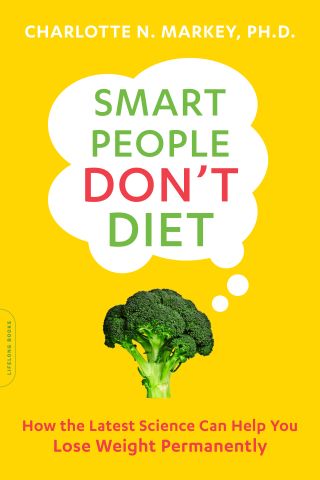Sleep
The 5 Secret Reasons We Don't Lose Weight
Why giving up fats and sweets isn't actually the way to go.
Posted March 23, 2015

We hear so many contradictory messages about the most effective path to weight loss that it is easy to feel confused. One day we think we are supposed to eat protein, the next day we think we should avoid it. Although fads will come and go, there is some concrete science to guide our weight-loss efforts—and one of the most important guidelines is to avoid the most common pitfalls.
I recently had a conversation with registered dietitian Georgie Fear, author of the forthcoming book Lean Habits for Lifelong Weight Loss (1). Together we assembled the following list of the 5 biggest mistakes people tend to make when trying to lose weight:
1. Skipping Sleep
Getting fewer than 7 hours of sleep per night causes a significant decrease in the hormone leptin. And low levels of leptin can leave you feeling not only tired the next day, but also extra hungry. Over time, not getting enough sleep clearly leads to an increased risk of obesity, but the effects are actually measurable after just one night of sleep shortage (2). To have an easier time slimming down, get into bed instead of watching one more show.
2. Avoiding Fat
Consuming a very low-fat diet shortchanges yourself on some important satiety pathways. Although you may initially feel full after eating a big salad with fat-free dressing, only a couple of hours may pass before your stomach is growling again. Dietary fat spurs the production of signaling molecules such as oleoylethanolamine (OEA), which results in hunger not returning for several hours (3). Fear's advice: If you want to stay satisfied (and stay away from the office vending machine) try to get 25 to 35 percent of your daily calories from fat. For a 500-calorie meal, that means somewhere in the neighborhood of 15 grams of fat.
3. Failing to Plan
Getting stuck at a movie with your kids when you haven't eaten in six hours is a tough situation, and it's probably not going to end well—unless you like the idea of Skittles and Pepsi for lunch. You don't have to rearrange your life around having absolutely perfect meals, but a little effort to set yourself up for success can make your life much easier. Keep some frozen vegetables on hand in case you run out of fresh ones, and stock a few cans of tuna or salmon for protein when you can't get to the store to buy turkey for sandwiches. Similarly, before going to a party, have a plan (Will you eat before? Have one plate of food from the buffet? Limit yourself to 1 to 2 drinks?). There is no completely right or wrong strategy, but knowing ahead of time what you want to do can help keep you from panicking, or worse yet, feeling powerless and giving up.
4. Giving Up Sweets
Swearing off some of your favorite foods has the unfortunate effect of making them even more desirable. Psychologists refer to this phenomenon as ironic processing (4, 5)—the more we try not to think about something, the more we tend to think about it! Further, when we then eat a forbidden item, we don't savor it. More likely, we hastily and secretly consume it, which does no favors for our stomachs or self-image. Instead, plan on including some of your favorite treats in your diet, but in a guilt-free manner. You might surprise yourself and find that a modest portion is far more satisfying when you actually let yourself enjoy it—and when you don't feel compelled to eat a whole box.
5. Changing Everything at Once
When Fear coaches clients, they often tell her, "This is too easy!” They want their weight-loss plans to be hard and dramatic, to feel as though they require Herculean effort on a daily basis. But the research is pretty clear: Simple and gradual change is far more sustainable (6). Herculean efforts never last long. It may be less exciting advice to make one small change at a time, but when you have a rough day, a heavy work week, or a couple of sick kids at home, you'll be more likely to stay in the game if what you're working on is small, incremental change. Staying in that mindset, day after day, is what really makes you a hero.
Don’t give up: Maintaining a healthy weight is one of the best things you can do for your health. Just don’t make it harder than it has to be!
@Copyright Charlotte Markey 2015

Smart People Don’t Diet (Da Capo Lifelong Books and Nero) by Dr. Charlotte Markey is available now wherever books are sold. You can follow Dr Markey on Twitter (@Char_Markey), Facebook (Dr. Charlotte Markey), Pinterest (Dr. Charlotte Markey), and on her website www.SmartPeopleDontDiet.com.

References
- Fear. G. (2015). Lean Habits For Lifelong Weight Loss: Mastering 4 Core Eating Behaviors to Stay Slim Forever. Salem, MA: Page Street Publishing Publication. Order here.
- Singh, M., Drake, C. L., Roehrs, T., Hudgel, D. W., & Roth, T. (2005). The association between obesity and short sleep duration: a population-based study. Journal of Clinical Sleep Medicine, 1(4), 357-363.
- Little, T. J., & Feinle-Bisset, C. (2011). Effects of dietary fat on appetite and energy intake in health and obesity—oral and gastrointestinal sensory contributions. Physiology & Behavior, 104(4), 613-620.
- Wegner, D. M., Schneider, D. J., Carter, S., & White, T. (1987). Paradoxical effects of thought suppression. Journal of Personality and Social Psychology, 53, 5–13.
- Markey, C. N. (2014). Smart People Don’t Diet: How the Latest Science Can Help You Lose Weight Permanently. New York: Da Capo-Lifelong Books. Order here.
- Mata, J., Todd, P. M., & Lippke, S. (2010). When weight management lasts: Lower perceived rule complexity increases adherence. Appetite, 54, 37–43.


